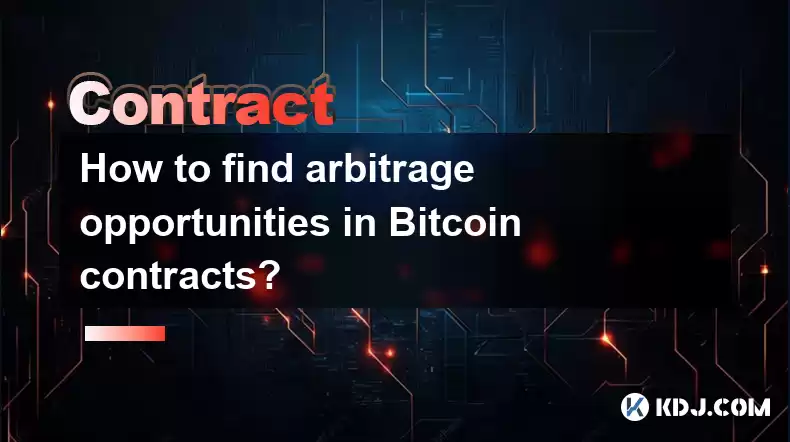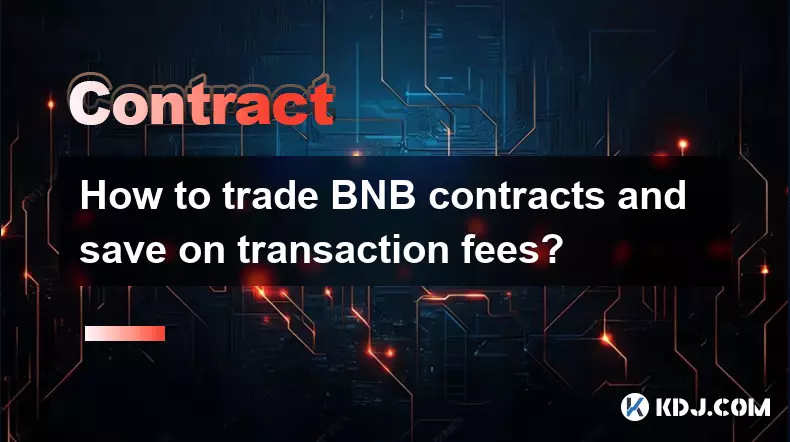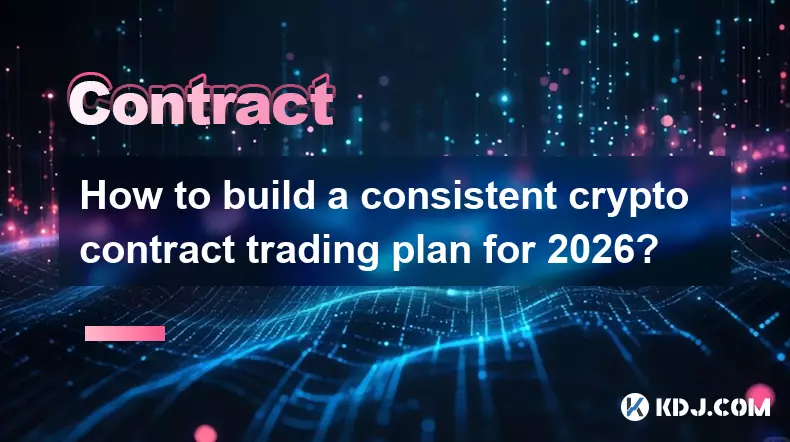-
 bitcoin
bitcoin $87959.907984 USD
1.34% -
 ethereum
ethereum $2920.497338 USD
3.04% -
 tether
tether $0.999775 USD
0.00% -
 xrp
xrp $2.237324 USD
8.12% -
 bnb
bnb $860.243768 USD
0.90% -
 solana
solana $138.089498 USD
5.43% -
 usd-coin
usd-coin $0.999807 USD
0.01% -
 tron
tron $0.272801 USD
-1.53% -
 dogecoin
dogecoin $0.150904 USD
2.96% -
 cardano
cardano $0.421635 USD
1.97% -
 hyperliquid
hyperliquid $32.152445 USD
2.23% -
 bitcoin-cash
bitcoin-cash $533.301069 USD
-1.94% -
 chainlink
chainlink $12.953417 USD
2.68% -
 unus-sed-leo
unus-sed-leo $9.535951 USD
0.73% -
 zcash
zcash $521.483386 USD
-2.87%
How to find arbitrage opportunities in Bitcoin contracts?
Bitcoin contract arbitrage exploits tiny price differences across exchanges, demanding real-time monitoring, high-speed connections, and automated systems for successful, yet risky, profit generation.
Mar 18, 2025 at 09:18 pm

- Arbitrage in Bitcoin contracts exploits price discrepancies across different exchanges.
- Identifying arbitrage opportunities requires real-time monitoring of multiple exchanges.
- Successful arbitrage trading demands speed, low latency connections, and automated systems.
- Risk factors include exchange delays, price volatility, and potential for losses.
- Understanding contract specifications (perpetual, futures) is crucial.
Bitcoin contract arbitrage involves capitalizing on price differences for the same Bitcoin contract across various cryptocurrency exchanges. This isn't about buying low and selling high on spot markets; it leverages the slight variations in pricing that can briefly exist between different platforms. These discrepancies, though often small, can be amplified through leveraged trading, offering potentially significant returns if executed quickly and efficiently.
Finding these opportunities isn't a passive activity. It necessitates constant monitoring of multiple exchanges simultaneously. You need access to real-time data feeds showing the current Bitcoin contract prices on each platform. This usually involves subscribing to professional-grade data providers or utilizing specialized arbitrage software. Manually checking multiple websites won't be fast enough to capture the fleeting opportunities.
One critical aspect is understanding the different types of Bitcoin contracts available. Perpetual contracts, designed to mimic spot prices, and futures contracts, with defined expiration dates, will often have slightly different prices. Arbitrage opportunities can arise from the differences in these contract types across exchanges, as well as between different perpetual contracts on the same exchange. Analyzing the funding rates of perpetual contracts is also vital as these rates can impact the profitability of arbitrage strategies.
To effectively exploit these price discrepancies, you'll need a robust trading infrastructure. High-speed internet with low latency is crucial, as even a fraction of a second delay can mean missing out on a profitable opportunity. Automated trading bots are essential for executing trades quickly and efficiently. These bots continuously monitor prices, identify arbitrage opportunities, and execute trades automatically, removing the human element and its associated speed limitations. Manual trading in this context is almost certainly doomed to failure.
The process of executing an arbitrage trade often involves these steps:
- Identify the Arbitrage: Your software or data feed alerts you to a price difference between two exchanges, showing a profit potential.
- Simultaneous Orders: You place a simultaneous buy order on the exchange with the lower price and a sell order on the exchange with the higher price.
- Profit Realization: Once both trades are executed, you lock in your profit, representing the difference in price across the two exchanges, less any fees.
However, arbitrage trading is not without its risks. Exchange delays can severely impact your profit margins or even lead to losses. If the price moves against you during the execution window, your trade might become unprofitable. Network latency, or issues with your trading software, could result in missed opportunities or even failed trades. Volatility in Bitcoin's price is another significant risk. Sudden price swings can wipe out any potential profits, or even lead to significant losses if leveraged trading is involved.
Understanding the fees charged by each exchange is also paramount. These fees can significantly eat into your profits, especially if the price differences are small. Some exchanges charge higher fees for faster trade executions, and choosing the right balance between speed and cost is vital for profitability. Always factor in the potential costs associated with withdrawals and deposits between different exchanges.
Moreover, the liquidity of each exchange plays a critical role. If one exchange doesn't have sufficient liquidity to fill your order, your arbitrage strategy might fail. It's crucial to choose exchanges with high trading volumes to ensure your trades can be executed smoothly. Ignoring liquidity can lead to partial fills, slippage, and ultimately reduced profits or losses.
Furthermore, regulatory considerations vary across jurisdictions. Ensure you are operating within the legal framework of your location and the exchanges you are using. Different countries have varying levels of regulatory oversight over cryptocurrency exchanges, and non-compliance can lead to serious consequences.
Common Questions:Q: Is Bitcoin contract arbitrage consistently profitable?A: No, arbitrage opportunities are fleeting and require significant technical expertise, high-speed infrastructure, and efficient algorithms. Profits are not guaranteed, and losses are possible.
Q: What software is needed for Bitcoin contract arbitrage?A: Specialized trading software or APIs that provide real-time data feeds from multiple exchanges and automated trading capabilities are essential.
Q: What are the risks involved in Bitcoin contract arbitrage?A: Significant risks include exchange delays, price volatility, liquidity issues, network latency, and regulatory compliance.
Q: Is Bitcoin contract arbitrage suitable for beginners?A: No, it requires advanced technical knowledge, sophisticated trading strategies, and significant capital investment. Beginners are strongly advised against attempting it.
Q: How can I learn more about Bitcoin contract arbitrage?A: Research reputable resources focusing on algorithmic trading, high-frequency trading, and cryptocurrency market microstructure. However, proceed with caution and avoid unreliable sources.
Disclaimer:info@kdj.com
The information provided is not trading advice. kdj.com does not assume any responsibility for any investments made based on the information provided in this article. Cryptocurrencies are highly volatile and it is highly recommended that you invest with caution after thorough research!
If you believe that the content used on this website infringes your copyright, please contact us immediately (info@kdj.com) and we will delete it promptly.
- Big Apple Bets: Ripple Takes Europe, Google Stumbles in Seoul – A Global Payments Tug-of-War
- 2026-02-03 01:20:02
- Bitcoin Futures Face Fresh Collapse Concerns as Market Nerves Fray
- 2026-02-03 01:10:01
- Ozark AI Ignites Crypto Buzz: Strategic Listings Fueling 700x Price Acceleration Talk
- 2026-02-03 01:20:02
- Bitcoin Price Dips Below $80,000, Sparking Market Sell-Off and Liquidations
- 2026-02-03 01:10:01
- Rome's Trevi Fountain: A Two-Euro Ticket to Taming the Crowds
- 2026-02-03 01:00:02
- Justin Sun's $100 Million Bitcoin Bet: A Contrarian Play Amidst Crypto Winter
- 2026-02-03 01:15:02
Related knowledge

How to close a crypto contract position manually or automatically?
Feb 01,2026 at 11:19pm
Manual Position Closure Process1. Log into the trading platform where the contract is active and navigate to the 'Positions' or 'Open Orders' tab. 2. ...

How to understand the impact of Bitcoin ETFs on crypto contracts?
Feb 01,2026 at 04:19pm
Bitcoin ETFs and Market Liquidity1. Bitcoin ETFs introduce institutional capital directly into the spot market, increasing order book depth and reduci...

How to trade DeFi contracts during the current liquidity surge?
Feb 01,2026 at 07:00am
Understanding Liquidity Dynamics in DeFi Protocols1. Liquidity surges in DeFi are often triggered by coordinated capital inflows from yield farming in...

How to use social trading to copy crypto contract experts?
Feb 02,2026 at 07:40am
Understanding Social Trading Platforms1. Social trading platforms integrate real-time market data with user interaction features, enabling traders to ...

How to trade BNB contracts and save on transaction fees?
Feb 03,2026 at 12:39am
Understanding BNB Contract Trading Mechanics1. BNB contracts are derivative instruments traded on Binance Futures, allowing users to gain leveraged ex...

How to build a consistent crypto contract trading plan for 2026?
Feb 02,2026 at 10:59pm
Defining Contract Specifications1. Selecting the underlying asset requires evaluating liquidity depth, historical volatility, and exchange support acr...

How to close a crypto contract position manually or automatically?
Feb 01,2026 at 11:19pm
Manual Position Closure Process1. Log into the trading platform where the contract is active and navigate to the 'Positions' or 'Open Orders' tab. 2. ...

How to understand the impact of Bitcoin ETFs on crypto contracts?
Feb 01,2026 at 04:19pm
Bitcoin ETFs and Market Liquidity1. Bitcoin ETFs introduce institutional capital directly into the spot market, increasing order book depth and reduci...

How to trade DeFi contracts during the current liquidity surge?
Feb 01,2026 at 07:00am
Understanding Liquidity Dynamics in DeFi Protocols1. Liquidity surges in DeFi are often triggered by coordinated capital inflows from yield farming in...

How to use social trading to copy crypto contract experts?
Feb 02,2026 at 07:40am
Understanding Social Trading Platforms1. Social trading platforms integrate real-time market data with user interaction features, enabling traders to ...

How to trade BNB contracts and save on transaction fees?
Feb 03,2026 at 12:39am
Understanding BNB Contract Trading Mechanics1. BNB contracts are derivative instruments traded on Binance Futures, allowing users to gain leveraged ex...

How to build a consistent crypto contract trading plan for 2026?
Feb 02,2026 at 10:59pm
Defining Contract Specifications1. Selecting the underlying asset requires evaluating liquidity depth, historical volatility, and exchange support acr...
See all articles










































































